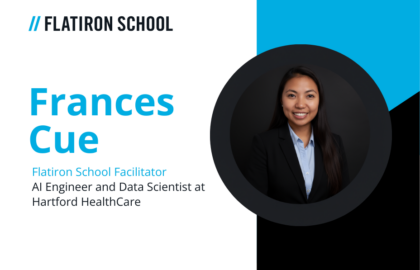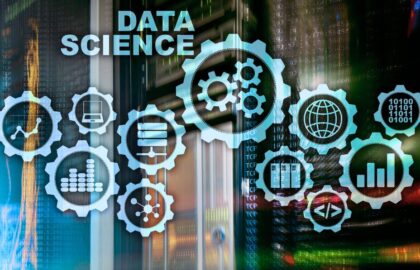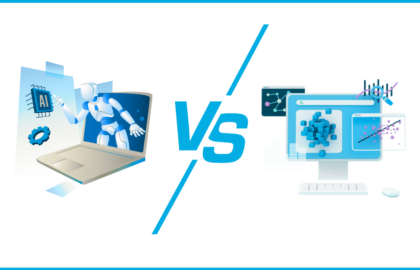Great Companies Hire Our Grads
Career Paths
The demand for Data Scientists remains at an all-time high. In fact, The Bureau of Labor & Statistics projections indicate a 36% national growth for Data Science roles from 2021 to 2031, which is much faster than the average for all occupations. Here are some in-demand jobs you could land:
Data Analyst
Average Salary: $82,640*The Data Analyst serves as a gatekeeper for an organization’s data so stakeholders can understand data and use it to make strategic business decisions.
*ZipRecruiter (October 2025)
BI Analyst
Average Salary: $99,864*Business Intelligence Analysts analyze data sets to discover insights, often used for important decision-making strategies throughout an organization.
*ZipRecruiter (October 2025)
AI Engineer
Average Salary: $101,752*AI engineers are primarily responsible for developing, testing, and deploying new applications and systems that utilize AI to improve performance and efficiency.
*ZipRecruiter (October 2025)
Data Scientist
Average Salary: $122,738*Data Scientists gather and analyze large sets of structured and unstructured data. They interpret results to create actionable plans for their organizations.
*ZipRecruiter (October 2025)
Hear From Our Grads
Student Stories
Each of these students pursued a career in data at Flatiron School.








Curriculum
Industry-approved curriculum to support your journey into Data Science.
Introduction to Python
This introduction to Python course covers essential programming concepts for data science. You’ll learn scripting basics, algorithms, and data structures like tuples and dictionaries, and explore Python libraries and functions. The course ends with a project where you’ll develop a Python script to analyze data, preparing you to tackle real-world data science challenges.
What you’ll learn:
- Apply the basics of programming language methodologies to real world scenarios
- Demonstrate foundational skills for scripting with a programming language, python
Introduction to Data Science
In this course, you’ll dive into data analysis and visualization using Python. You’ll learn statistical measures, explore data types, and master techniques with the pandas library. You’ll also use Seaborn and Matplotlib for visualization, handling qualitative, quantitative, and multivariate data. The course concludes with a project where you conduct a full exploratory data analysis, applying descriptive analysis and visualization skills, and object-oriented programming principles. By the end, you’ll be skilled in data insights, advanced analysis, and effective visualization.
What you’ll learn:
- Implement foundational statistical measurement with data using scripting
- Demonstrate gathering insights from data with visualizations
- Integrate object oriented programming (OOP) with Python for data cleaning and analysis
Introduction to SQL
This course covers SQL, data engineering, database administration, and data analysis. You’ll learn math, probability, and statistics for data science and advance your Python skills for data cleaning and analysis. Starting with SQL basics, you’ll progress to advanced topics like filtering, ordering, and joining data. The course concludes with a project where you apply SQL queries in a Python environment, demonstrating your understanding of database concepts and preparing you for real-world data science challenges.
What you’ll learn:
- Utilize industry standard techniques to analyze data with, programming language (python), structured query language (SQL), and the cloud.
- Explore and manipulate data with mathematics, probability, and statistics
- Analyze data for a business problem with visualizations with a dashboard
Cloud Computing, Generative AI, & Dashboards
This course focuses on cloud computing for cost-effective, scalable data processing. You’ll master technical components like PySpark to integrate Python, SQL, and Spark for handling structured and semi-structured data. Using libraries such as Numpy, Pandas, and PySpark, you’ll work with big data and create stunning visualizations with Python libraries like Seaborn. The course also explores advanced data analysis using generative AI and interactive dashboards, culminating in a project that brings big data to life through visualizations.
What you’ll learn:
- Create a dashboard using data science methodologies with industry standard tool(s)
- Model exploratory data analysis with tools for multiple data sets. (SQL and SQL table relations)
- Utilize programming techniques to process large data samples with (PySpark and Big Data)
Inferential Statistics
This course teaches statistical inference with Python, covering probability distributions, confidence intervals, and hypothesis testing. You’ll apply these techniques to analyze proportions, means, categorical data, and multivariate datasets. The course concludes with a final project where you’ll showcase your ability to analyze a multivariate dataset using various statistical inference methods.
What you’ll learn:
- Integrate statistical inference of data using the technical programming
- Implement methodologies for statistical inference
- Utilize mathematics, statistics, & probability for data science methodologies to derive insights
Regression
This course teaches regression techniques for analyzing real-world datasets. You’ll master linear and multiple linear regression, learning diagnostics, model evaluation, and advanced techniques like transformations, interactions, and regularization methods such as Lasso and Ridge. The course concludes with a project where you’ll build and interpret a multiple linear regression model.
What you’ll learn:
- Perform logistic regression with data sets using programming techniques, lasso and ridge.
- Compare statistical results for different types of regression with data sets, linear, transformations of linear, and multiple linear regressions
- Utilize mathematics, statistics, & probability for data science methodologies to derive insights
Introduction to Machine Learning
This course introduces the fundamentals of AI and machine learning, covering core concepts like statistical learning theory and supervised learning. You’ll explore models such as logistic regression, decision trees, and support vector machines, and learn to evaluate them using metrics like ROC AUCs. The course concludes with a project where you’ll select and deploy the ideal model for a specific task, demonstrating your mastery of the data science pipeline.
What you’ll learn:
- Utilize foundational machine learning modeling like decision trees and supervised learning
- Prepare data for machine learning modeling with preprocessing (feature extraction) and normalization
- Utilize mathematics, statistics, & probability for data science methodologies to derive insights
Machine Learning with Scikit-Learn
This course covers both supervised and unsupervised machine learning models. You’ll learn about distance metrics and k-Nearest Neighbors for classification, recommender systems using SVD, clustering techniques like k-means, and dimensionality reduction with PCA. The course concludes with a project where you’ll build and demonstrate both a supervised (k-Nearest Neighbors) and an unsupervised (k-means) learning model, showcasing your skills in classification and clustering tasks.
What you’ll learn:
- Utilize foundational machine learning modeling like decision trees and supervised learning
- Prepare data for machine learning modeling with preprocessing (feature extraction) and normalization
- Integrate mathematics, statistics, & probability for data science methodologies to derive insights
Natural Language Processing, Time Series & Neural Networks
This course teaches skills to build advanced models, focusing on natural language processing (NLP) with techniques like text classification and vectorization, time series analysis for managing and visualizing trends, and neural networks using Keras. The course culminates in a project where you’ll build and showcase three models: a language model, a time series model, and a basic neural network.
What you’ll learn:
- Develop insights from language, time, and image data using neural networks and Natural Language Processing (NLP)
- Integrate mathematics, statistics, & probability for data science methodologies to derive insights
Neural Networks & Similar Models
This course builds on neural network fundamentals, teaching optimization techniques like normalization and regularization. You’ll explore Convolutional Neural Networks (CNNs) for image classification, Recurrent Neural Networks (RNNs) for forecasting and sequence data, and advanced models like transformers and BERT. The course concludes with a project where you’ll demonstrate your expertise by building an advanced neural network application.
What you’ll learn:
- Create an advanced neural network application
- Integrate mathematics, statistics, & probability for data science methodologies to derive insights
Large Language Models
This course equips you with the skills to deploy and optimize cutting-edge machine learning systems in real-world scenarios. You will explore the open-source MLOps stack, learning to manage the entire ML lifecycle, including deployment, monitoring, and version control. The course emphasizes data-centric approaches for enhancing the performance of large language models (LLMs) through high-quality data curation and preprocessing. You will also master techniques for fine-tuning pre-trained models and leveraging prompt engineering to optimize output for specific tasks. By the end of the course, you will be adept at integrating and maintaining advanced AI solutions in dynamic environments.
What you’ll do:
- Utilize machine learning models and the open-source MLOps Stack
- Integrate data-centric LLMs with data science methodologies to derive insights
- Leverage model fine-tuning and prompt engineering to optimize business solution oriented outputs
Prerequisites:
- Course: Introduction to Machine Learning
- Course: Machine Learning with Scikit-Learn
- Course: Natural Language Processing, Time Series & Neural Networks
AI Capstone
In this intensive course you will be tasked with developing 2 different projects. In these projects you will be expected to frame your projects around solving a business problem. You will be expected to bring all your skills from Foundations together to build 2 different methods: a classification supervised model, and a classified unsupervised large language model.
What you’ll do:
- Integrate data science process using at least one method of non-regression supervised learning
- Integrate data science process using at least one method of non-regression unsupervised learning
- Utilize mathematics, statistics, & probability for data science methodologies to derive business insights
Prerequisites:
- Course: Introduction to Machine Learning
- Course: Machine Learning with Scikit-Learn
- Course: Natural Language Processing, Time Series & Neural Networks
- Course: Neural Networks & Similar Models
- Course: Large Language Models
You’ll receive a certificate of completion upon passing all programs. Once you complete Capstone — you’ll be ready to jump head-first into the job search with 180 days of career support.
A Supported Journey, From Start To Finish
From day one you’ll have access to our student services team — there to answer any questions you have about courses or the enrollment process. Our only mission is to help you achieve life-changing results through our programs. We’re dedicated to your educational success, and you’ll never have to do it alone.
Your Life Won’t Wait For A Career Change
Our programs offer maximum flexibility to fit education into your life – not the other way around.
Full-Time
You’re ready to commit to a full-time course load. You’ll graduate in 15 weeks thanks to a rigorous schedule.
- 15 weeks
- 100% online
- Learn along with your cohort
- Course highlights:
- Learn from industry experts with real-world experience
- Project-based learning
- Optional weekly sessions with your facilitator
- Discord with classmates and other Flatiron students
Part-Time
Our part-time course is designed for busy people. If you don’t have 8 hours to dedicate a day, then part-time is for you.
- 45 weeks
- 100% online
- Flexible learning at your own pace
- Course highlights:
- Learn from industry experts with real-world experience
- Project-based learning
- Optional weekly sessions with your facilitator
- Discord with classmates and other Flatiron students
Upcoming Course Start Dates
| Start Date | Pace | Location | Discipline | Status |
|---|---|---|---|---|
|
February 2, 2026
Feb 2, 2026
|
Full-Time | Online | Artificial Intelligence | Open |
|
February 2, 2026
Feb 2, 2026
|
Part-Time | Online | Artificial Intelligence | Open |

Tuition
Whether you are learning full-time or part-time, our programs are the same price.
$17,500As low as $9,900
We have 3 easy ways to pay:
- Pay up front & in full
- Pay with a traditional loan
- Pay with a payment plan
Frequently Asked Questions
We don’t require you to have any prior experience! In fact, this program is designed for complete beginners. Our admissions requirements are being at least 18 years old, having a high school diploma, a GED or equivalent credential, having a native or highly proficient fluency in English, and completing the admissions process.
Full-time programs are 15 weeks long, and you’ll be logged on and learning remotely full-time. Part-time programs are 45 weeks long and offer the most flexibility day to day. Both pacings are held entirely remotely and include optional weekly sessions with your program’s facilitator.
If you would like to connect with a member of our team, please simply schedule a chat with one of our Admissions representatives.
1. Take the Assessment: Take our short 15-minute cognitive assessment. Don’t worry, no studying or technical skills required! This step is required for admission.
2. Create a Genius Account: You’ll receive an email from Genius, a platform we use to guide you along the registration process. You’ll create an account and use it to register through our course catalog.
A solid grasp of high school math is important. Review algebra, functions, and graphing, and revisit probability and descriptive statistics since these foundations lead directly into inferential statistics and machine learning later in the program.
Basic computer literacy is expected. Students should know how to navigate files, install programs, and use spreadsheets. Since the curriculum begins with Python (Course 1), having some exposure to logical thinking or simple coding (like Excel formulas) is helpful.
Students should have experience reading charts, graphs, or reports. This helps in moving into exploratory data analysis, SQL queries, and data visualization later in the program.
The data science curriculum is designed to be highly beginner-friendly, even for those with no prior technical experience. It starts with foundational concepts, introducing programming languages like Python in a step-by-step manner, ensuring you can learn at a comfortable pace. Mathematical concepts, such as statistics and linear algebra, are taught with a focus on practical applications, making them accessible and relevant. Additionally, the program includes hands-on projects, real-world examples, and guided exercises to help you build confidence as you progress. With plenty of support, including mentorship and resources, the curriculum ensures that anyone, regardless of their technical background, can successfully transition into data science.
Our curriculum reflects the latest industry trends in tools, technology, frameworks, and methodologies. By teaching both fundamentals and advanced practices, learners are prepared for roles such as Data Analyst, Data Engineer, Data Scientist, Machine Learning Engineer, and AI Solutions Engineer. The curriculum integrates tools that appear most often in job postings on platforms like LinkedIn and Indeed. Python is included as the primary programming language, supporting data manipulation, automation, and machine learning. SQL is also taught for querying databases, as it remains one of the top skills employers require. In addition, libraries such as Pandas enable students to clean and transform datasets quickly, reflecting the daily tasks of analysts and scientists.
All assessments in the curriculum are designed to reflect real business problems. Instead of only testing theory, students are asked to apply their knowledge to situations that resemble challenges faced in government, corporate, or non-profit settings. This approach helps learners connect technical skills with practical decision-making.
The assessments move beyond simple coding tasks. Each project or case study begins with a business question—for example, “How can a company predict customer churn?” or “How can a hospital use data to improve patient scheduling?” Students then use methods such as exploratory data analysis, SQL queries, or machine learning models to find solutions.
Common learning assets include case studies, datasets, and capstone projects. Retail data may be used for building sales forecasts. Financial datasets often appear in assignments on fraud detection or risk modeling. Medical records (anonymized) may be used to teach prediction of health outcomes.
Students learn machine learning, neural networks, and deep learning using frameworks such as TensorFlow and PyTorch. They also gain hands-on practice with Hugging Face for Large Language Models and Generative AI. These topics reflect current industry shifts, where automation, natural language processing, and generative systems are changing how data science and AI are applied. This integration means learners do not just use the latest tools but also understand why those tools work, how they connect to statistics and computing, and when to apply them in professional settings.




